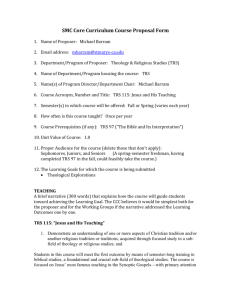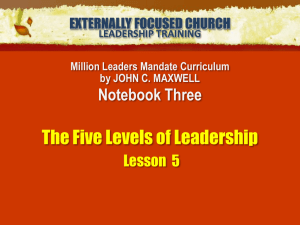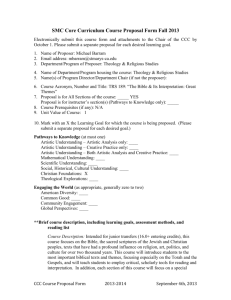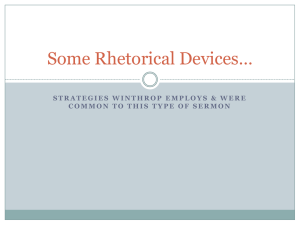Proposal
advertisement
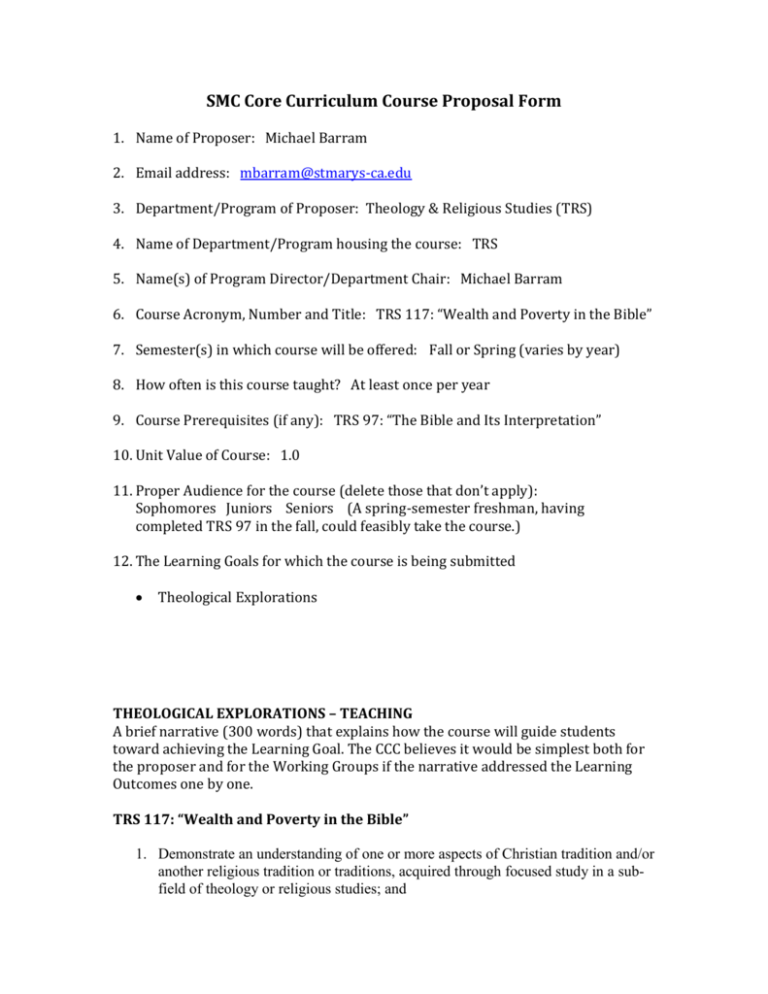
SMC Core Curriculum Course Proposal Form 1. Name of Proposer: Michael Barram 2. Email address: mbarram@stmarys-ca.edu 3. Department/Program of Proposer: Theology & Religious Studies (TRS) 4. Name of Department/Program housing the course: TRS 5. Name(s) of Program Director/Department Chair: Michael Barram 6. Course Acronym, Number and Title: TRS 117: “Wealth and Poverty in the Bible” 7. Semester(s) in which course will be offered: Fall or Spring (varies by year) 8. How often is this course taught? At least once per year 9. Course Prerequisites (if any): TRS 97: “The Bible and Its Interpretation” 10. Unit Value of Course: 1.0 11. Proper Audience for the course (delete those that don’t apply): Sophomores Juniors Seniors (A spring-semester freshman, having completed TRS 97 in the fall, could feasibly take the course.) 12. The Learning Goals for which the course is being submitted Theological Explorations THEOLOGICAL EXPLORATIONS – TEACHING A brief narrative (300 words) that explains how the course will guide students toward achieving the Learning Goal. The CCC believes it would be simplest both for the proposer and for the Working Groups if the narrative addressed the Learning Outcomes one by one. TRS 117: “Wealth and Poverty in the Bible” 1. Demonstrate an understanding of one or more aspects of Christian tradition and/or another religious tradition or traditions, acquired through focused study in a subfield of theology or religious studies; and Students in this course will meet the first outcome by means of training in biblical studies, a foundational and crucial sub-field of theological studies. The course is focused on a wide range of biblical texts that pertain to questions and values related to money, wealth, poverty, and economic justice—and the worldviews and implied values that such texts reflect and seek to engender. Students can anticipate gaining thorough familiarity with these biblical texts and traditions (from Hebrew Bible creation accounts, to covenantal legal provisions and prophetic testimony, to the New Testament Gospels), as they also begin to develop the kind of hermeneutical awareness and core interpretive skills needed for advanced biblical scholarship (e.g., the interpretive role of social location, an ability to use redaction- and narrative-criticism, and an ability to engage with scholarly biblical commentaries). Thus, students will not only learn the content of these texts, they will learn how to interpret them—even as they explore how they have been interpreted. 2. Demonstrate an ability to explore religious questions from a believer’s point of reference and from the critical perspective of the academy. Students in this course will meet the second outcome through exploring—and learning to reflect deeply upon—the ways in which these texts and traditions can be and have been understood—and, in a variety of ways, extrapolated upon—by a range of interpreters. Students will consider the import, significance, and potential implications of these texts from the perspective/s of believers, that is, from the vantage point of those who understand these texts as a form of revelation about the nature and character of God, as a window into the human situation, as a guide for life, and so forth. Interpretive questions of this nature are inherently theological, ethical, existential, communal, and personal. Also, students will learn to explore texts as budding biblical scholars, incorporating analytical methods (e.g., literary, historical) and critical tools (e.g., scholarly commentaries) standard in the academy. Incidentally, the fact that students in Saint Mary’s classrooms come from a range of different religious and non-religious perspectives naturally means that our class discussions explore texts from both believers’ and a non-believers’ perspectives. Course materials enable students to explore a range of perspectives, even among those that come from “believers’ points of view” (i.e., from Catholics, Protestants, from liberation theology, from Catholic Social Teaching, and so forth). Students from any perspective can learn from an academic exploration into the content, worldview, values, and potential implications of biblical texts, even if their primary orientation to the material is one of comparing biblical literature and interpretation with their own perspectives. Indeed, ‘believers’ inevitably benefit from interpreting the course material along with other students of different perspectives. THEOLOGICAL EXPLORATIONS – LEARNING Learning: A brief explanation of how coursework (e.g., papers, exams, videotaped presentations) will be used to measure student achievement of each of the Learning Outcomes. Please address the outcomes directly and one by one. TRS 117: “Wealth and Poverty in the Bible” 1. Demonstrate an understanding of one or more aspects of Christian tradition and/or another religious tradition or traditions, acquired through focused study in a subfield of theology or religious studies; and Students learn about biblical studies, generally, and biblical texts about money, wealth, poverty, and economic justice (and so forth), more specifically, through lectures and readings (biblical and secondary), and they are held accountable for that learning through written assignments, tests, and exegetical papers. Almost daily written assignments (via the class’s Moodle website) are used so that students can demonstrate that they have read the assigned material (whether primary texts from the Bible or secondary class texts). These written assignments involve responding to questions posed by the professor, questions that can get at everything from basic content acquisition to existential engagement with the material. Much of the content and theoretical material in the course, from knowledge of biblical texts and contexts, to textual implications and theories, is assessed through the two examinations. Both of the exams test biblical (and relevant contextual and theoretical knowledge), usually through a mix of ‘objective’ (e.g., short answers; identifications; multiple choice; matching) and ‘subjective’ (e.g., essays) questions. Students also demonstrate significant learning through exegetical papers. These paper assignments provide students with a guided framework for learning (in part, inductively) how to go about analyzing texts as scholars do; the papers build on the basic content and theoretical knowledge that students have gained through readings and class lectures/discussion. In the final analysis, the written assignments, exams, and exegetical papers combine to give students ways to show that they have learned the content of the Bible; that they know about scholarly discussions regarding biblical texts relevant to the course theme; that they know how to go about interpreting a passage; and that they have learned to think through a variety of hermeneutical issues and concerns that face interpreters of biblical texts. The various assessment mechanisms function in an interlocking way. Content issues are covered primarily in written assignments and tests. Awareness of scholarship is assessed primarily through tests and papers. Written assignments and papers are the primary forms of assessing students’ ability to interpret texts and their knowledge of hermeneutical issues. At certain points, though, all three primary forms of assessment (written assignments, tests, papers) assist in giving students an opportunity to demonstrate their learning in these various areas. 2. Demonstrate an ability to explore religious questions from a believer’s point of reference and from the critical perspective of the academy. Much of this assessment is done through written assignments and via paper writing (as well as during class discussion). In written assignments, students are often asked to explore theological, ethical, and existential concerns related to the various texts that we read. In these assignments, and during in-class discussions, we often raise questions about how believers interpret passages under our examination, considering import, significance, and potential implications. These ‘believer’s point of reference’ questions are not exclusive to believers, of course, but they are usually not rooted in a conscious scholarly hermeneutic or methodology as such. The exegetical papers students write also ask them to be able to explore such “believer’s” concerns. Students get significant opportunities to demonstrate an ability to explore biblical texts “from the critical perspective of the academy.” These issues come up via secondary readings and class discussions—and in written papers, primarily. Students are expected to show on exams and in papers that they know not only what scholarly theories and methods are, but also that they can make use of them. They are required to interact with scholarly interpretations (via standard, scholarly biblical commentaries) on their papers. In this course, special emphasis is placed on the potential implications (relevant for insiders and outsiders) of biblical themes regarding economic justice. The class reads two books that are not about biblical studies per se, but which build and/or extend theologically on much of what we read. The books by Labberton and Rieger are very different; Labberton’s book is written to churchgoers (very much an insider’s perspective) and wrestles with what he sees as some of the deeply personal roots of injustice (i.e., how we as humans see [or fail to see] our world, how we name our world [often incorrectly], and what actions might need to be taken once we begin to see and name our world and others more appropriately). It is an interesting read; for students who are not religious, it provides a window into the way that internal religious language and pastoral exhortation/dialogue functions— and for religious students, it sounds familiar while sounding what are often unfamiliar themes regarding injustice. The Rieger book is written by a theologian, but at a very academic and analytical level. It explores the ways in which both contemporary religion and economics are rooted in problematic metaphors and structures of power (and he assesses the effects of these phenomena on human beings and society). It demonstrates to students what academic theology can look like—and how it can address very concrete and timely issues in ways that are academically complex and intellectually stimulating. Students get to demonstrate their learning from the Labberton book primarily in written assignments and in class discussions. The Rieger book, which is difficult for students, is assessed primarily through a major essay question on the final exam—a question for which they can prepare, but which forces them to engage deeply with the arguments raised by the author. In short, students have the opportunity—through written assignments, tests, and papers (as well as through in-class discussions)—to demonstrate that they have learned to think about biblical texts and interpretation from a range of perspectives, both scholarly and more lay-oriented.

